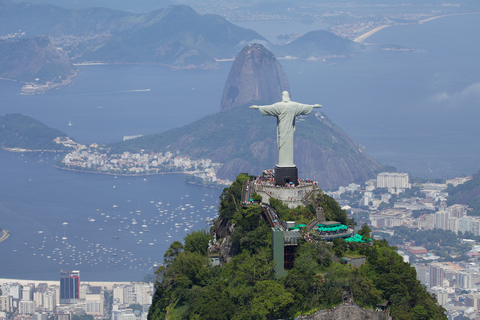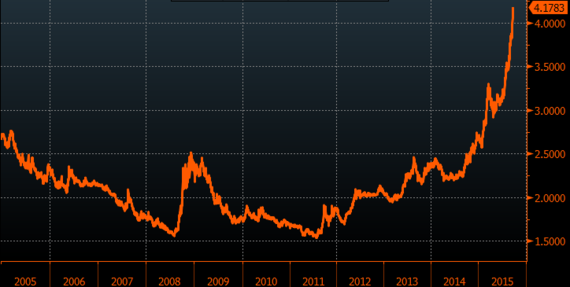 Investors have lost faith in Brazil, and rightfully so. The currency has lost 36% of its value against the U.S. dollar this year, plunging nearly 7% in the last week alone. Yields on its bond issues are spiking, as investors demand higher and higher rates to loan Brazil or Brazilian companies money. Just six years ago in November 2009, Brazil made the cover story for The Economist magazine, with a photo where the famous Jesus statue in Rio (at Corcovado) rocketed into the sky, titled "Brazil takes off." Partly due to global circumstances, but principally due to its own policies, Brazil is landing hard. And it seems it has further to go.
Investors have lost faith in Brazil, and rightfully so. The currency has lost 36% of its value against the U.S. dollar this year, plunging nearly 7% in the last week alone. Yields on its bond issues are spiking, as investors demand higher and higher rates to loan Brazil or Brazilian companies money. Just six years ago in November 2009, Brazil made the cover story for The Economist magazine, with a photo where the famous Jesus statue in Rio (at Corcovado) rocketed into the sky, titled "Brazil takes off." Partly due to global circumstances, but principally due to its own policies, Brazil is landing hard. And it seems it has further to go.
To understand why Brazil is in such trouble now, its helpful to understand why everyone thought the country was such a darling years ago. In the 1980s and 1990s, Brazil was a typical basket case emerging market, with such bad policies and management that the country suffered hyperinflation and ultimately defaulted on its debts. Toward the end of the 1990s, the government got its act together and the economy righted itself. In 2002 its famous socialistic President Lula (Luis Inacio Lula de Silva) inherited a country with relatively stable institutions and wisely left them mostly alone, understanding that the government would have more money to spend on its pet projects if the economy was doing well and investor money poured in. Externally, Brazil was in a sweet spot. The commodity super-cycle was in full force, and the country not only had massive oil and mining capabilities, but it seemed new oil fields were discovered every six months. This commodity largesse spilled into government coffers, and policymakers started giving money away through large welfare programs that in turn helped previously very poor people become buyers of durable goods like fridges and washing machines for the first time. Brazil seemed the first country to make a serious dent in income inequality. All this good news attracted record capital flows into the country, and Brazil was the darling of global investors, posh magazine spreads, supermodels, and cocktail varieties.
The 2008 crisis hit Brazil hard, but ultimately China and the Federal Reserve saved the day, and gave Brazil's constituents a false sense of security. China's way out of the crisis was to initiate massive infrastructure projects, which caused China to buy a ton of Brazil goods (steel and oil, for example). The Fed's way out of the crisis was to bring interest rates in the U.S. to zero, and incentivize U.S. and global investors to take risk and chase yieldy assets, such as those in Brazil. Unsurprisingly then, Brazil popped out of the recession quickly, as money poured in. Unsurprisingly, as Brazil transitioned from President Lula to President Dilma (Dilma Rousseff), policymakers became lazy. Reforms stalled. The government loosened the fiscal taps so that not only did it send families even bigger checks, but also funneled massive resources to its "friends and family" corporations via super cheap financing. It seemed money rained from heaven, and there was no saving for a drought. A massive hubris took hold.
In 2013, cracks in the support system began to appear. The Fed started to tighten monetary policy, and China started hitting bumps in its economic boom. In 2014, oil prices began to plummet. And while everyone knew corruption existed in the country, all hell broke loose with the revelation of a massive scandal centered around its oil company gem Petrobras, which continues to spill over to many other sectors in the economy and countless politicians. This summer, China's malaise became even more pronounced, while the Fed advertised an imminent hike in rates at home. Suddenly, Brazil was bereft of all of its support systems, and foreign investors have been racing out of the country. Brazil lost its important investment grade rating last week. Ever since, there are no buyers, just sellers.
Is it time to catch the falling knife? Unless you are a day trader looking to capitalize on a quick pullback from a wildly excessive daily move, the answer is no, as the facts do not support a lasting turnaround in Brazil at this time. First, while the Fed has delayed its hikes, it is likely to raise rates sometime in the next six months. As I argued in a previous blog (click here), with the Fed raising rates, emerging markets need to look much cheaper and much prettier. Brazil is looking cheaper, but certainly not prettier. Second, while I believe China's issues aren't as detrimental as the market worries them to be, the country does not appear to be on the verge of another commodity importing boom, so Brazil can't export its way out of the mess. Third, the scandal that has tainted domestic confidence is still growing, not fading. Brazilians do not trust their government; the President's approval rating is a dismal 8%.
Which leads me to decide to wait before I put my money into Brazil. Of the possible things that could incentivize me, a change in the government would top the list. It's not impossible (though maybe not probable) that President Dilma gets impeached, or resigns. Second, if the central bank decides to take a page out of the old Emerging Markets Manual, from the Chapter called "What to do in a Crisis" and raises interest rates a massive 5% (500 bps) or so from the already high level of 14.25%, for example, I would be very tempted to buy some local currency bonds. After all, Brazil has the ability to put itself on the right track, it's just choosing not to. If they pay enough interest to compensate for the risk, and then some, I would guess money would stop leaving the country and would buy some time to get better policies in place.
At some point, instead of smelling smoke, the politicians will feel their pants on fire, and realize they have to change their ways. I will not become a longer-term investor in Brazil until this happens.
Personal Website: http://sarazervos.wordpress.comLinkedIn: https://www.linkedin.com/in/sarajzervosTwitter: @SaraZervos

